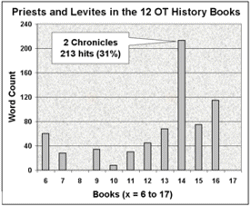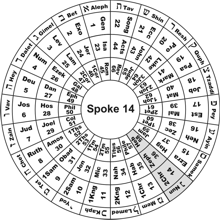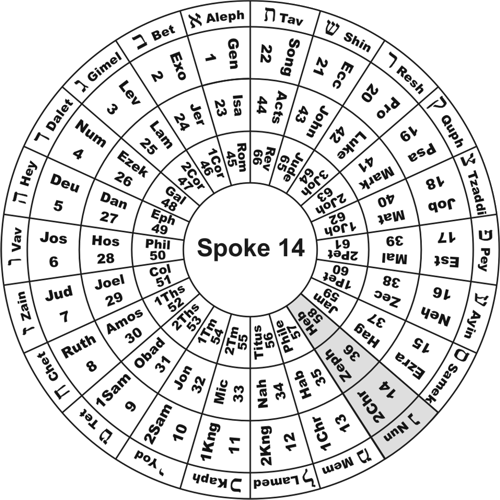Priestly History of Faithful Judah
And the Spirit of God came upon Azariah the son of Oded: And he
went out to meet Asa, and said unto him, Hear ye me, Asa [King of Judah], and
all Judah and Benjamin; The LORD is with you, while ye be with him;
and if ye seek him, he will be found of you; but if ye forsake him, he will
forsake you. Now for a long season Israel hath been without the true
God, and without a teaching priest, and without law. But when they in
their trouble did turn unto the LORD God of Israel, and sought him, he was
found of them. And in those times there was no peace to him that went out, nor
to him that came in, but great vexations were upon all the inhabitants of the
countries. And nation was destroyed of nation, and city of city: for God did
vex them with all adversity. Be ye strong therefore, and let not your hands be
weak: for your work shall be rewarded.
2 Chronicles 15:1ff (Spoke 14, Cycle 1)
The Fourteenth Book records the history from Solomon's glorious reign down to the horror and degradation
of the Babylonian Exile. But it is no vain repetition of the history previously recorded.
It has a very specific character that is the key to its integration with the rest of Scripture.
As usual, J. Sidlow Baxter faithfully hit the heart of the essential issues (Explore the Book, Vol 2, pg 165):
Chronicles is a retelling of the story already told in the books of Samuel and the Kings,
but from a different standpoint, with new emphases and new aspects, with significant additions and omissions,
and supplying completive interpretations. In fact, it is in this repetition, with its characteristic additions
and omissions, that the peculiar viewpoint and significance of the Chronicles are perceived; for if
we read these "chronicles" side by side with the earlier ac-counts in Samuel and Kings, we soon begin to
notice that the addition and omissions all seem of the same sort, that is, they all seem to conform to
one focal purpose. What, then, is the unifying idea running through theses
additions and omissions? And what
is the central purpose of the Chronicles?
 The characteristic "additions and omissions" are of two primary types. First, the history is restricted
almost entirely to the Southern Kingdom of Judah, with only tangential references to the Northern Kingdom
of Israel which was, as we saw on Spoke 12 (Bible Wheel Book, pg 255), utterly corrupt and apostate from
the beginning. As noted there, Jeroboam the son of Nebat forced Israel into idolatrous worship
of golden calves and a false religion. Each and every priest who would remain faithful to the Lord
had to leave, and leave they did:
The characteristic "additions and omissions" are of two primary types. First, the history is restricted
almost entirely to the Southern Kingdom of Judah, with only tangential references to the Northern Kingdom
of Israel which was, as we saw on Spoke 12 (Bible Wheel Book, pg 255), utterly corrupt and apostate from
the beginning. As noted there, Jeroboam the son of Nebat forced Israel into idolatrous worship
of golden calves and a false religion. Each and every priest who would remain faithful to the Lord
had to leave, and leave they did:
For the Levites left their suburbs and their possession, and came to Judah and Jerusalem:
for Jeroboam and his sons had cast them off from executing the priest's office unto the LORD:
And he ordained him priests for the high places, and for the devils, and for the calves which he had made.
2 Chronicles 11:14 (Spoke 14, Cycle 1)
This brings us to the second unique characteristic of 2 Chronicles.
It contains an extreme emphasis on the faithful remnant of the Levitical Priesthood.
There are numerous parallel passages between the Books of Kings and 2 Chronicles where only the
latter even mentions the Levitical Priesthood at all. For example, consider this parallel record
of Josiah's Passover:
| 2 Kings 23:22-23 | 2 Chronicles 35:18-19 |
| Surely there was not held such a passover from the days of the judges that judged Israel,
nor in all the days of the kings of Israel, nor of the kings of Judah; But in the eighteenth year
of king Josiah, wherein this passover was held to the LORD in Jerusalem.
|
And there was no passover like to that kept in Israel from the days of Samuel the prophet;
neither did all the kings of Israel keep such a passover as Josiah kept, and the priests,
and the Levites, and all Judah and Israel that were present, and the inhabitants of Jerusalem.
In the eighteenth year of the reign of Josiah was this passover kept.
|
These texts speak of the same event using almost the same words except for the reference to
"the priests and the Levites" in 2 Chronicles. God Himself has "cast out" the priests and Levites from the
historical record that includes the apostate Kingdom of Israel! The statistics are astounding. The two books of
Kings contain exactly one reference to the Levites, whereas the book of 2 Chronicles mentions them sixty-five times!
This is its characteristic emphasis. Note that the theme of Passover, which happened on
the Fourteenth Day, is also a special theme of the Fourteenth Spoke.
| Parallel Passages where ONLY 2 Chronicles mentions the Levites |
| 1 Kings 8:10-11 |
2 Chronicles 5:11-14 |
| And it came to pass, when the
priests were come out of the holy place, |
And it came to pass, when the
priests were come out of the holy place |
| MISSING |
(for all the priests that were present were sanctified, and did not then wait by course:
Also the Levites which were the singers, all of them of Asaph, of Heman, of Jeduthun,
with their sons and their brethren, being arrayed in white linen, having cymbals and psalteries and harps,
stood at the east end of the altar, and with them an hundred and twenty priests sounding with trumpets:)
It came even to pass, as the trumpeters and singers were as one, to make one sound to be heard in praising
and thanking the LORD; and when they lifted up their voice with the trumpets and cymbals and instruments of
music, and praised the LORD, saying, For he is good; for his mercy endureth for ever: |
| that the cloud filled the house of the LORD, So that the priests could not stand to minister because of the cloud: |
that then the house was filled with a cloud, even the house of the LORD; So that the priests could not stand to minister by reason of the cloud: |
| 1 Kings 8:63-64 | 2 Chronicles 7:5-7 |
| So the king and all the children of Israel dedicated the house of the LORD. |
so the king and all the people dedicated the house of God. |
| MISSING |
And the priests waited on their offices: the Levites also with instruments of music of the
LORD, which David the king had made to praise the LORD, because his mercy endureth for ever,
when David praised by their ministry; and the priests sounded trumpets before them, and all Israel stood. |
| The same day did the king hallow the middle of the court that was before the house of the LORD |
Moreover Solomon hallowed the middle of the court that was before the house of the LORD: |
| 2 Kings 11:5-7 | 2 Chronicles 23:4-7 |
| This is the thing that ye shall do; A third part of you that enter in on the sabbath
shall even be keepers of the watch of the king's house; And a third part shall be at the gate of Sur;
and a third part at the gate behind the guard: so shall ye keep the watch of the house, that it be not broken down.
And two parts of all you that go forth on the sabbath, even they shall keep the watch of the house of the
LORD about the king. |
This is the thing that ye shall do; A third part of you entering on the sabbath, of the priests and of
the Levites, shall be porters of the doors; And a third part shall be at the king's house;
and a third part at the gate of the foundation: and all the people shall be in the courts of the house of the LORD.
But let none come into the house of the LORD, save the priests, and they that minister of the Levites;
they shall go in, for they are holy: but all the people shall keep the watch of the LORD.
And the Levites shall compass the king round about, every man with his weapons in his hand;
and whosoever else cometh into the house, he shall be put to death: |
Just look at that! We have overwhelming evidence of design wherever we look. We saw the same thing with the
parallel passages amongst the Synopitic Gospels [see the Solution of
the Synoptic Problem]. Note also that the priestly theme so dominant in 2 Chronicles (Spoke 14, Cycle 1)
links directly to Hebrews (Spoke 14, Cycle 3), which is the one and only "priestly" book of the New Testament.
This article is drawn from the material in
pages 272-274 of the Bible Wheel book. It is based on the Nun KeyWord ne'eman (faithful) which also
dominates Hebrews on Cycle 3.
|



